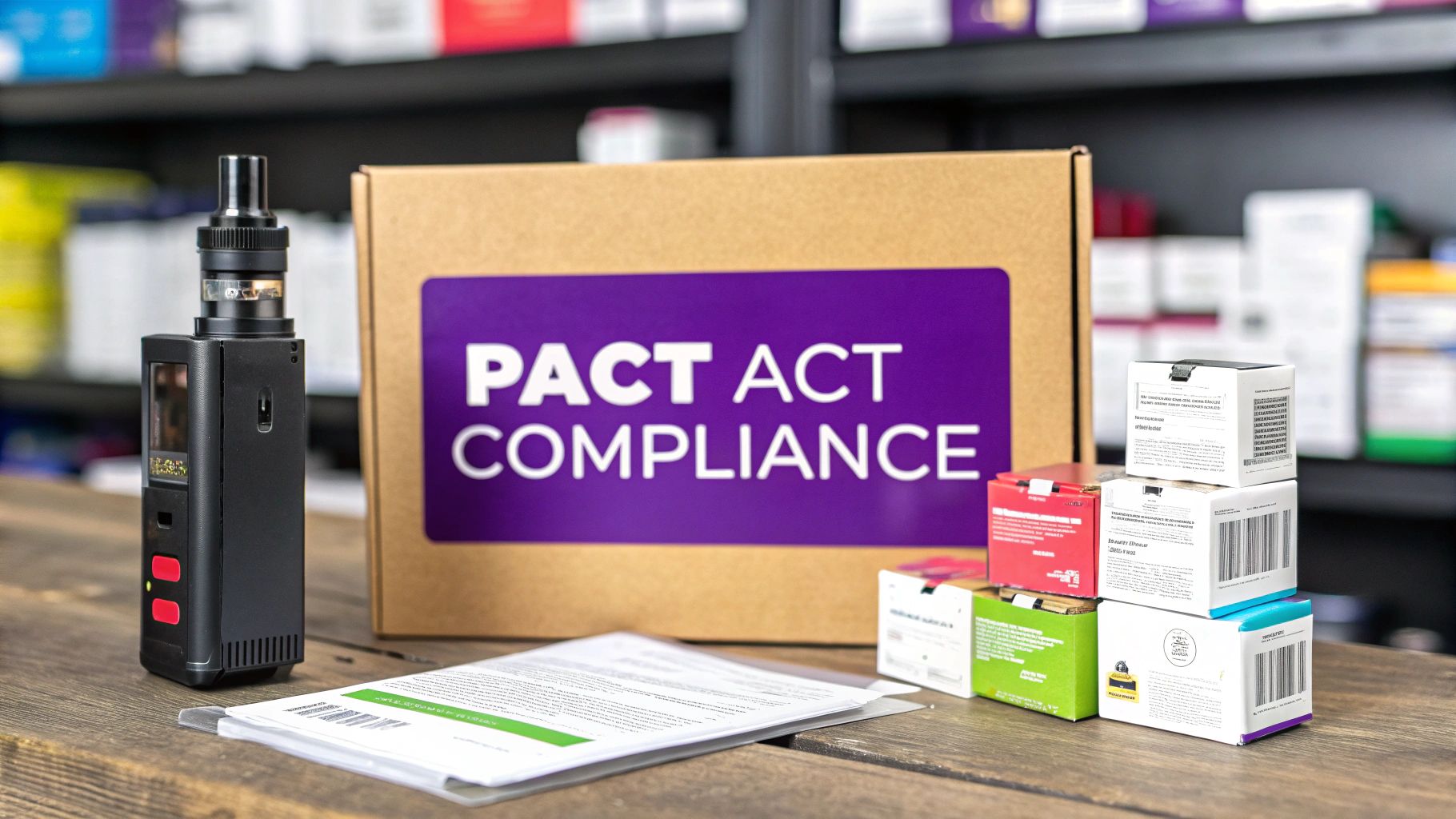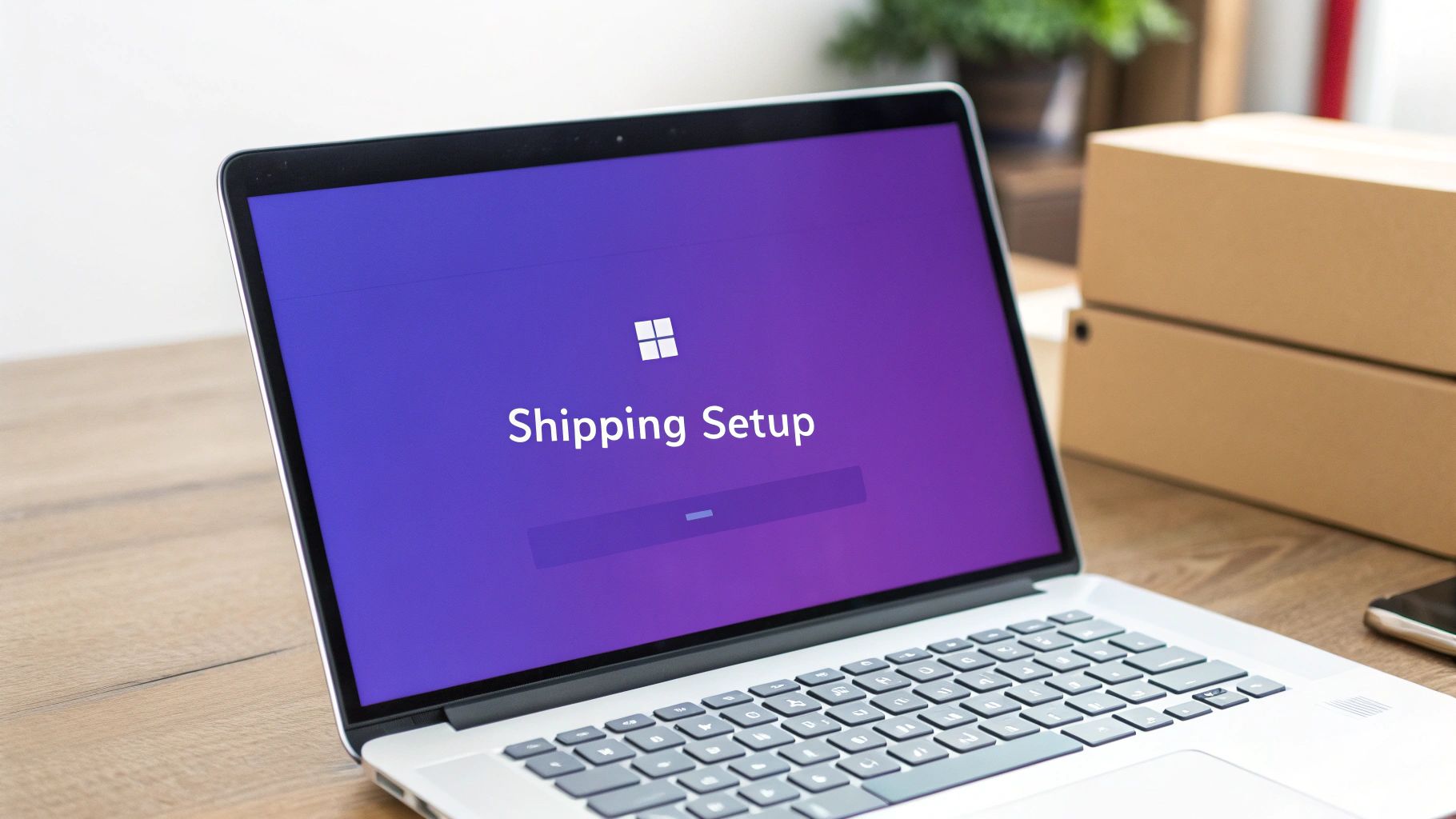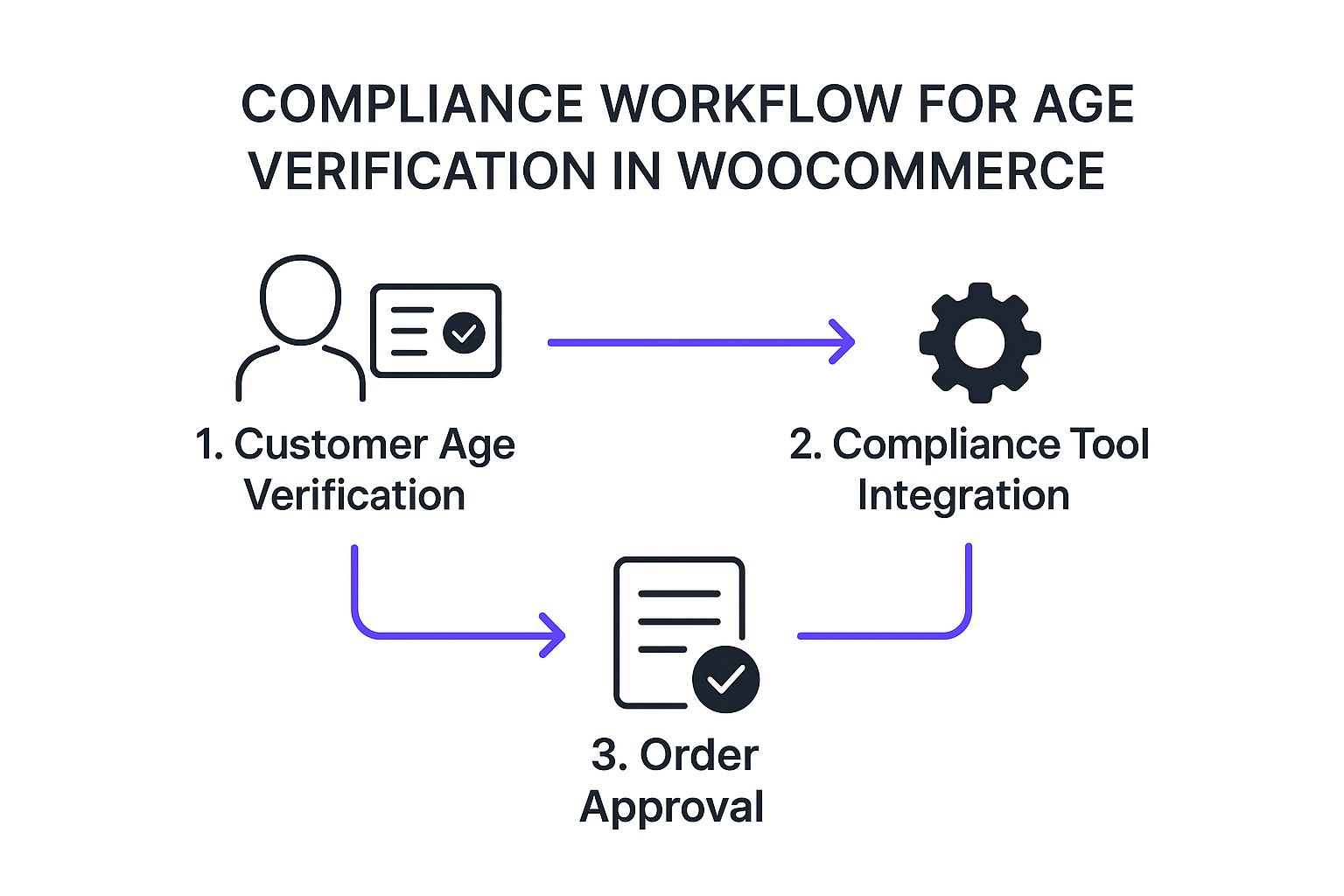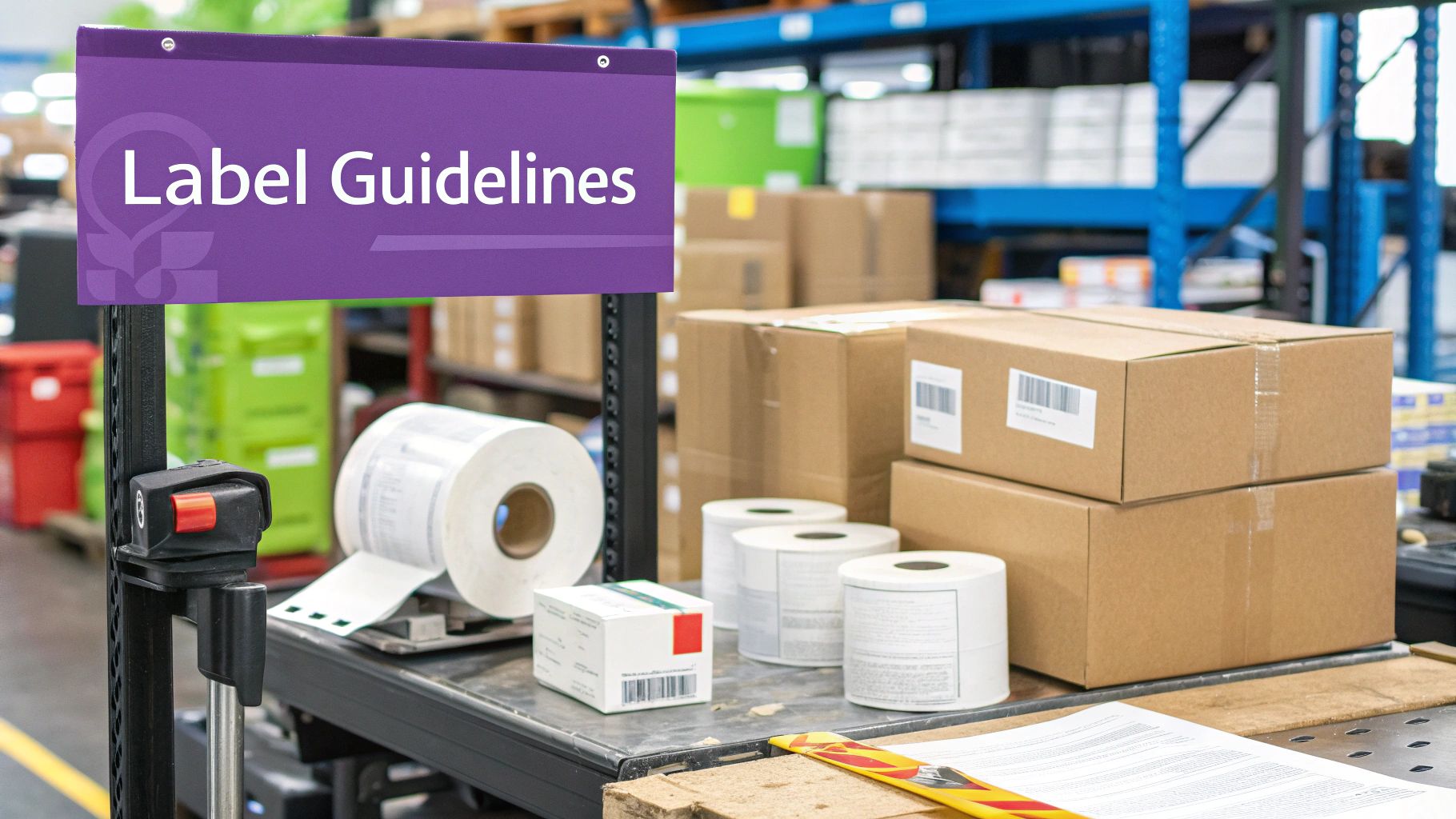
PACT Act Compliance: Vape and Tobacco Shipping in WooCommerce
Learn how to ensure PACT Act Compliance: Vape and Tobacco Shipping in WooCommerce. Optimize your store, manage restrictions, and stay compliant today!
Cody Y.
Updated on Aug 29, 2025
Selling vape and tobacco products on your WooCommerce site means you're playing in a different league, one with a rulebook called the Prevent All Cigarette Trafficking (PACT) Act. This isn't just about avoiding a few fines; it's about setting up your entire operation to navigate complex shipping rules, state-by-state tax collection, and mandatory age verification just to stay in business.
The Reality of PACT Act Shipping Challenges
For anyone running a WooCommerce store in this space, the PACT Act isn't just another regulation—it's a massive operational hurdle. It completely reshaped how vape and tobacco products can be sold online, turning what used to be a simple "ship-to-customer" process into a maze of federal, state, and local compliance checks.

The real challenge is its sheer complexity. The Act demands far more than just blocking sales to a few states. It forces you to build a multi-layered compliance strategy that touches every single part of your business, from the moment a customer lands on your site to the second a package arrives at their door.
The Core Compliance Pillars You Can't Ignore
If you want to navigate the PACT Act successfully, you have to master several key areas. Each one brings its own set of headaches that can easily overwhelm sellers who aren't prepared.
- Federal and State Registration: First off, you have to register with the ATF. Then, you need to register with the tobacco tax administrator in every single state you plan to ship to.
- Tax Collection and Remittance: You're on the hook for collecting and paying all the right federal, state, and local excise taxes. This is a huge accounting lift.
- Airtight Shipping Requirements: Forget about using USPS for consumer shipments—it's prohibited. You must use a private carrier that can verify the recipient's age and get an adult signature at the door, every time.
- Monthly Reporting: Get ready for paperwork. You have to submit detailed reports of all your sales to state tax administrators every month. This is a massive administrative burden.
These aren't just suggestions; they're federal mandates with steep penalties for getting it wrong. You can get a much deeper look at the specific regulations for the https://shiprestrict.com/industries/tobacco-vape to really grasp the scope of what's required.
Key Takeaway: PACT Act compliance is not a one-and-done setup. It’s an ongoing grind of registration, tax management, carrier logistics, and meticulous monthly reporting that demands constant attention.
The Prevent All Cigarette Trafficking (PACT) Act, which was massively expanded back in March 2021, brought all online sellers of electronic nicotine delivery systems (ENDS)—that means vapes, e-liquids, and accessories—under these strict rules. This is what created the high-stakes environment we operate in today, where a single slip-up can lead to crippling fines or even getting your business shut down.
Core PACT Act Requirements for WooCommerce Stores
To put it all in perspective, here's a quick summary of the essential obligations you'll be dealing with. This isn't an exhaustive list, but it covers the big-ticket items that will directly impact your day-to-day operations.
| Requirement Area | Key Obligation | Impact on Your Store |
|---|---|---|
| Federal & State Registration | Register with the ATF and the tax administrator in every state you ship to. | Requires significant upfront administrative work and ongoing maintenance of registrations. |
| Tax Compliance | Collect and remit all applicable federal, state, and local excise taxes for each sale. | Demands a robust accounting system capable of handling complex, jurisdiction-specific tax rates. |
| Age & ID Verification | Implement a reliable age verification system at checkout and ensure adult signature on delivery. | Adds friction to the checkout process and increases shipping costs due to specialized carrier services. |
| Shipping & Delivery | Use approved private carriers only (USPS is banned) that offer adult signature services. | Limits your choice of shipping providers and can significantly raise fulfillment expenses. |
| Record-Keeping & Reporting | Maintain detailed records of every transaction and submit monthly compliance reports to each state. | Creates a heavy, recurring administrative workload that requires meticulous attention to detail. |
Failing to manage any one of these areas puts your entire business at risk. This is why having an automated system in place isn't a luxury—it's a necessity for survival in the online vape and tobacco market.
Building Your Compliance Foundation
Before you even think about WooCommerce settings or installing a single plugin, you have to get your legal foundation right. I’ve seen businesses get shut down because they skipped this part, and it’s not a pretty sight. The absolute first, non-negotiable step is getting all the necessary licenses and registrations squared away at both the federal and state levels.

This whole process kicks off with the federal government. You are required to register your business with the Bureau of Alcohol, Tobacco, Firearms and Explosives (ATF). This isn't just a suggestion; it's a mandatory prerequisite for legally shipping these products across state lines under the PACT Act.
At the same time, you have to register with the tobacco tax administrator in every single state you plan to ship to. Each one has its own unique set of rules, paperwork, and fees. It's a massive headache, I know, but it’s absolutely essential.
Secure a PACT-Compliant Shipping Partner
Once your licensing is in order, the next big hurdle is finding a shipping carrier. This is a tough one, because the PACT Act flat-out prohibits shipping vape products to consumers through the United States Postal Service (USPS). To make matters worse, the big players like FedEx and UPS have their own internal policies against shipping these items to individual customers.
This leaves you with a pretty small pool of private, regional carriers or specialized third-party logistics (3PL) providers. Finding a reliable partner who offers a PACT-compliant service is everything.
Here’s what you need to look for:
- Adult Signature Required (ASR) Service: The carrier must have a service that verifies the recipient is 21+ and gets a real signature at the door. No exceptions.
- Willingness to Handle Vape/Tobacco: Dig into their company policy. Make sure it explicitly allows them to ship Electronic Nicotine Delivery Systems (ENDS) and other regulated products.
- Regional Coverage: Don't just take their word for it. Verify their network actually covers the specific states and towns where your customers live.
Partnering with a carrier that truly understands PACT Act requirements isn't just a logistical choice—it's a core piece of your entire compliance strategy. A single mistake here can lead to seized shipments and penalties that can cripple your business.
Establish Your Record-Keeping System
Last but not least, you need a bulletproof system for tracking every single sale and shipment. The PACT Act mandates that you keep meticulous records for at least four years. These records can be audited at any time and are what you'll use to generate the monthly compliance reports you have to file with each state's tax authorities.
Your system needs to track everything, including:
- Customer names and full addresses
- Quantities and the specific types of products sold
- All shipping details and tracking numbers
Getting these three foundational pillars—licensing, shipping, and record-keeping—locked down from day one is the only way to build a legal, sustainable vape or tobacco e-commerce business. Think of it as the essential pre-flight check before you even touch your WooCommerce dashboard.
Setting Up State-Specific Shipping Rules
Okay, you’ve done the legal homework and lined up your logistics. Now it’s time to put those PACT Act requirements into practice on your WooCommerce store. This is where we move from theory to the hands-on work of building a compliant, automated system.
Using a plugin like Ship Restrict is the difference between manually—and nervously—checking every single order and having a system that enforces your rules 24/7, even while you sleep.
The goal here isn't just to throw up a wall and block a few states. It's about building a smart, surgical system. You need to stop illegal shipments cold without turning away legitimate customers from states where you can ship. Let's walk through how to build a real-world rule from scratch to see how PACT Act compliance in WooCommerce really works.
Creating Your First Geographic Restriction
Let's use a common scenario: your store needs to block all shipments of vape products to California, where state law creates major hurdles. Trying to catch every California-bound order by hand is a recipe for disaster. One slip-up, and you're in hot water.
Instead, we can build a simple but powerful rule in Ship Restrict to automate this entire process.
It all boils down to defining three things:
- What to Restrict: Are you blocking specific products or entire categories? For this example, it would be your "Vape Products" or "E-Liquids" category.
- Where to Restrict It: This is the geographic fence. It can be as big as a country or as small as a single ZIP code. Here, we'll pick the state of California.
- What to Do: When the conditions match, what action should the store take? We want to block the shipment completely.
This is just one piece of the puzzle. The image below shows how these automated rules fit into the larger compliance workflow, from customer verification to the final order approval.

As you can see, a solid system handles both age and location checks before an order is ever placed, which is exactly what you want.
A Practical Walkthrough with Ship Restrict
Let's actually build that California rule.
From your WooCommerce dashboard, head into the Ship Restrict settings to create a new rule. First thing, give it a clear name you'll recognize later, like "Block All Vape Sales to CA."
Next, you'll set the conditions. This is the "if-then" logic. You'll tell the plugin to apply the rule when the shopping cart contains a product from your "Vape Products" category. This is the key step—it isolates the restriction to only the regulated items.
Then, you define the "where" by selecting "State" from a dropdown and choosing "California."
Finally, you set the action to "Prevent Shipping." This is also where you can write a custom message for the customer. Don't just leave a generic error. Write something clear and helpful, like, "Due to state regulations, we cannot ship vape products to California." This kind of transparency is huge for customer service because it explains why their order can't go through.
Key Insight: The best compliance is proactive, not reactive. By setting these rules, you prevent an illegal order from ever being placed. That saves you the headache of canceling orders, processing refunds, and worrying about fines.
That's it. This one rule, which takes just a couple of minutes to create, automates a critical piece of your PACT Act compliance for thousands of potential orders. You can then rinse and repeat this process for every other state, county, or city with shipping bans, building a comprehensive web of protection for your business.
If you want to dig deeper into the strategy, our guide on how to block shipping to specific states with Woo-Commerce plugins offers more examples and ideas.
Managing Complex Shipping and Carrier Logic

Simply blocking shipments to entire states is just the first layer of PACT Act compliance. That’s the easy part. The real challenge is navigating the patchwork of state-by-state rules where you can ship, but only under very specific, heavily restricted conditions.
This is where a basic setup completely falls apart. True PACT Act compliance in WooCommerce means you have to manage these complex scenarios without a hitch. What happens when a state allows your products but demands you use a specific carrier that offers adult signature verification? Or when a customer’s cart has both regulated vape juice and unregulated items like t-shirts? You can't just block the whole order.
You need to move beyond simple geographic blocks and start building rules that control how products get from your warehouse to the customer. The goal is to enforce compliance without creating a clunky, frustrating checkout that drives everyone away.
Forcing PACT-Compliant Shipping Methods
Let's walk through a common, real-world situation. Say you’ve partnered with a regional carrier that offers a special—and more expensive—“PACT-Compliant Adult Signature” delivery service. It’s absolutely critical that every single order with a vape product uses this specific shipping method. At the same time, you don't want to force that pricey option on someone just buying a hoodie.
With a tool like Ship Restrict, you can create a rule that isolates your regulated products and forces the correct shipping option at checkout. It’s pretty straightforward:
- First, define the trigger. You start by telling the system which products need special handling. This is usually as simple as selecting your "Vape Products" or "E-Liquids" category.
- Next, set the allowed method. Then, you specify that when these products are in the cart, the only available shipping option is your "PACT-Compliant Adult Signature" service.
- Finally, hide everything else. The rule automatically hides all your other standard shipping options (like "Standard Ground" or "Free Shipping") whenever a regulated item is in the cart. This completely removes the chance of human or customer error.
This setup ensures every regulated shipment goes out the door correctly, with the required signature verification, while your other customers get a normal, friction-free checkout experience.
Adapting to Evolving State Tax Laws
Getting this level of control right is more important than ever, as states are constantly tightening the screws on their regulations. The financial stakes are getting higher, making compliance errors more costly than they've ever been.
For example, states like California and Indiana have dramatically increased their tax rates and reporting requirements to beef up PACT Act enforcement. As of July 1, 2025, California's excise tax on vapor products will hit a staggering 54.27% of the wholesale cost. On that same day, Indiana is doubling its tax on closed-system cartridges to 30% of the wholesale price. These states aren't just raising taxes; they're also demanding incredibly detailed monthly reports with SKU-level data. You can explore more about these evolving state-level requirements to get the full picture.
Key Takeaway: The PACT Act is not a static, set-it-and-forget-it rulebook. States are actively raising taxes and reporting demands, which makes automated, granular control over your shipping and checkout an absolute necessity. A single mistake can lead to serious financial penalties.
Managing this mess requires a system that is both powerful and precise. You need the ability to create layered rules that account for product categories, shipping zones, and specific carrier services. By doing so, you can build a checkout process that’s smart enough to enforce compliance on regulated items without disrupting the sale of everything else in your store.
Don't Forget: Shipping Is Only One Piece of PACT Act Compliance
Getting your shipping rules dialed in is a huge step, but it's just one piece of the PACT Act puzzle. If you only focus on shipping restrictions with a plugin like Ship Restrict, you're leaving your business dangerously exposed. Think of it like locking your front door but leaving all the windows wide open.
A truly compliant PACT Act strategy for WooCommerce has to cover age verification, obsessive record-keeping, and a bulletproof system for handling the monthly reporting grind. These aren't just best practices—they're non-negotiable legal mandates with staggering penalties for getting them wrong.
Step 1: Lock Down Age Verification
Before a customer even gets to the shipping options, you have to prove they're old enough to buy. This isn't a simple "Yes, I'm 21" checkbox. The PACT Act demands that you use a legitimate, third-party age verification service that plugs directly into your checkout. This system must check a customer's identity and age against public records before their credit card is ever charged.
You'll find several excellent services that work seamlessly with WooCommerce. When you're picking one, make sure it has:
- Real-time verification that doesn't add friction or slow down the checkout flow.
- Direct WooCommerce integration to automatically block any underage purchase attempt.
- A proven track record with high-risk industries like vape, tobacco, or alcohol.
Key Takeaway: Age verification is your first line of defense. A failed age check needs to stop a sale cold, long before any shipping rules even matter. It’s the single most important step in protecting your business and keeping products out of the hands of minors.
Step 2: Master Your Record-Keeping and Reporting
Once you've made a legal, age-verified sale, your compliance work is just getting started. The PACT Act mandates that you keep incredibly detailed records for every single sale for a minimum of four years. This isn't just for your own books; this data is the foundation for the mandatory monthly reports you have to file with the ATF and the tax administrator in every single state you ship to.
Your records have to be perfect. You need to track:
- The full name and address of every customer.
- The exact products and quantities sold in each order.
- All associated shipping and package tracking information.
This is a massive administrative burden. Honestly, trying to manage this with a handful of spreadsheets is a recipe for disaster. Most successful vape businesses either invest in specialized compliance software or partner with a 3PL (third-party logistics) provider who handles all the reporting as part of their fulfillment service.
Putting a solid system in place to organize this data is critical. It ensures you can pull accurate reports on demand, helping you avoid the crippling fines and potential shutdowns that come from reporting errors. Getting your shipping rules straight is a great first step, and you can learn more about how to restrict shipping in WooCommerce to build out that foundational layer of your compliance plan.
Common PACT Act Questions for WooCommerce Stores
Even with the best tools, the PACT Act can feel like a maze. The regulations are dense, and bad advice spreads like wildfire in online forums. Getting straight answers to common sticking points is the only way to feel confident in your compliance setup.
This section tackles the most frequent questions we hear from store owners trying to implement these complex rules. Think of it as your quick-reference guide for clearing up confusion and solving specific problems.
Can I Just Ship Vapes Through USPS?
It’s a question that comes up all the time: "If I follow all the other PACT Act rules, can I still use USPS?" The answer is a hard no.
A cornerstone of the updated PACT Act is a complete and total ban on the United States Postal Service shipping any electronic nicotine delivery systems (ENDS) to consumers. This isn't a guideline; it's an absolute prohibition with no exceptions or workarounds. You are required to use a private carrier that offers a dedicated, PACT-compliant shipping service.
Any carrier you use must provide:
- Adult Signature Confirmation: The person signing for the package must be over 21.
- ID Verification: The driver must physically check a government-issued ID to confirm the recipient's age at the door.
- PACT-Compliant Service: The carrier must be properly registered and have a specific service tier for handling these regulated items.
Does the PACT Act Cover 0% Nicotine Products?
Another murky area for many is whether nicotine-free products fall under the law. The answer here is almost always yes, it does. The government wrote the definition of an "electronic nicotine delivery system" to be intentionally broad.
The law covers any component, liquid, part, or accessory of a vape device, "whether or not it contains nicotine." That means your 0% nicotine e-liquids, along with hardware like coils, tanks, and batteries, are all subject to the PACT Act. For compliance, the safest and only correct approach is to treat all vape-related products as fully regulated.
The penalties for getting this wrong are severe. They aren't just slaps on the wrist; we're talking substantial civil and criminal fines, potential imprisonment, and getting your business added to a public non-compliant list—which effectively blackballs you from using legitimate shipping carriers.
Trying to fly under the radar simply isn't an option. The risk is enormous, and the consequences can permanently shut down your operation. A single violation can easily trigger an audit, uncovering wider compliance failures and burying your business in a mountain of legal and financial problems you can't climb out of.
Ready to automate your shipping compliance and stop worrying about costly mistakes? Ship Restrict gives you the granular control you need to enforce PACT Act rules right inside your WooCommerce store. Build a safer, smarter, and fully compliant checkout today. Learn more and get started at ShipRestrict.com.

Cody Yurk
Founder and Lead Developer of ShipRestrict, helping e-commerce businesses navigate complex shipping regulations for regulated products. Ecommerce store owner turned developer.